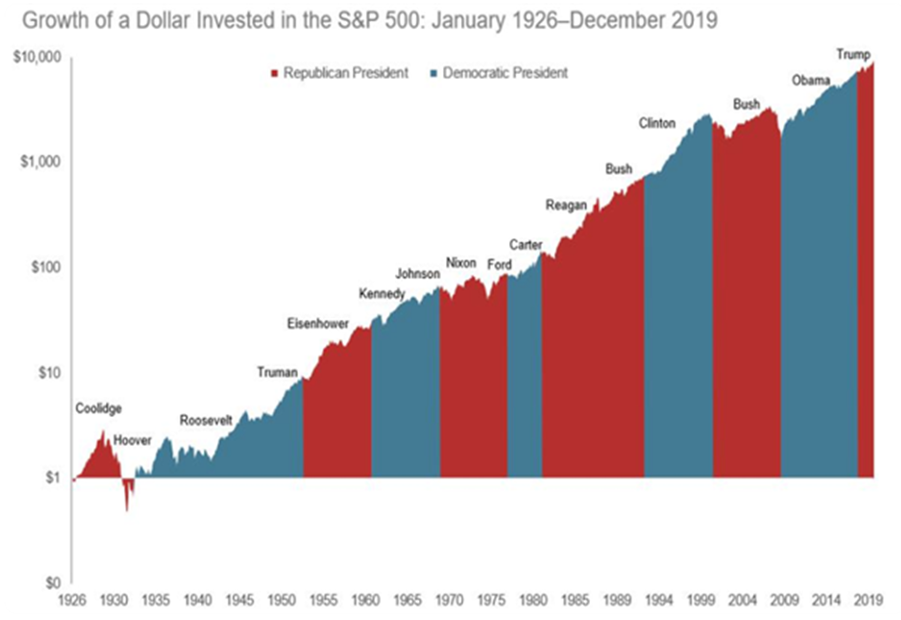

In a little under a week’s time, we should have a good idea of whether Joe Biden will be number 46 – that is, the 46th US President. In 2016, the major US television networks called the election for President Trump early Wednesday morning (around 6.30pm AEST) after he won the state of Wisconsin.
This year it may be even closer, and with concerns about the validity of mail-in ballots, the result could yet be decided in the courts and take weeks. Of course, the US Election is not one election but a myriad of local, state and federal ballots, including the election of the entire House of Representatives and one-third of the US Senate. Results in the Senate could have a greater impact on US markets because if Biden wins, they will govern what he can do.
Currently, the Democrats control the House of Representatives with 232 members compared to the Republicans with 198. There are also 4 vacant seats and one held by an independent. Apart from Donald Trump, no one expects the Republicans to take the House.
In the 100-member Senate, 35 seats are up for grabs. Presently, there are 53 Republicans, 45 Democrats and 2 Independents (who caucus with and typically vote with the Democrats). According to RealClear Politics, it projects the new chamber to have 45 Democrats, 46 Republicans and 9 “toss ups”. If the “toss ups” go the way of the latest polls, the Democrats will pick up 5 seats and lose 1, giving them a 51 to 49 majority. It only takes 50 seats to govern because the Vice-President has the casting vote in the event of a tie.
This leads to three likely scenarios. Firstly, a clean sweep with a President Joe Biden, the Democrats taking control of the Senate and retaining control of the House. The second scenario, considered by some to be the most likely, is for Biden to win the Presidency but the Republicans to retain the Senate (probably by the slimmest of margins). The third scenario is the “status-quo” – the re-election of President Donald Trump and a split Congress, the Republicans controlling the Senate and the Democrats the House.
What does this mean for the markets?
If Trump wins, then get set for an immediate relief rally because they are Donald backers and will welcome his pro-business/low tax agenda. The Congress will be split, meaning that there will still be gridlock in Washington. The critically important stimulus package to sustain the economy in the post Covid-19 environment will be passed, but won’t be as big as many had been calling for and the rally might run out of steam.
Under President Joe, the stimulus package will be larger and the increased government spending should be a big fillip for markets. Domestically focussed US companies, including those in the consumer discretionary, industrial and cyclical sectors, will be winners.
Another big set of winners could be companies in the renewable energy sector, as Biden has promised to re-join the Paris Agreement and sign the USA up to a target of zero net emissions by 2050.
On the downside, Biden has promised to reverse President Trump’s tax cuts and take the company tax rate back to 28%. Personal taxes for those earning more than $400,000 will also be increased. He has scared the oil industry with his pledge to phase out fossil fuels and “ban fracking” (he has since corrected this to a “ban on fracking on Federal lands”). Oil and energy companies will be hit, as well the traditional Democrat foes of “big pharma” and healthcare. Another group that might come under pressure are big tech names such as Facebook and Alphabet (Google’s parent), who are viewed by the Democrats as wielding too much power. Greater regulation, or even separation, could be on the agenda.
In a clean sweep scenario, Biden will be in a position to implement his tax increases and the markets could get very nervous over this prospect. Otherwise, he is back to dealing with a split Congress and it is hard to see a Republican controlled Senate voting to increase company taxes.
Interestingly, Democrat Presidents have always presided over secular bull markets except for Roosevelt in the latter half of the 1930s. The following chart shows the performance of the S&P 500 with Republican presidents (in red) and Democrat presidents (in blue).
US Market – Republican vs Democrat President

So, history is also on Biden’s side. While the stimulus package remains his biggest ace, he is likely to be quite conservative about handling the virus, which could put a brake on economic growth in the short term for hopefully a better medium term pay-off.
But Democrat presidents are viewed with suspicion by markets, so for me, it comes down to whether it is a clean sweep or not. If Biden wins and controls the Senate, markets sell off before re-assessing. If Biden wins and the Republicans maintain control, the markets take the result in their stride and then wait for the stimulus package. In either scenario, oil, “big pharma” and healthcare will be losers.